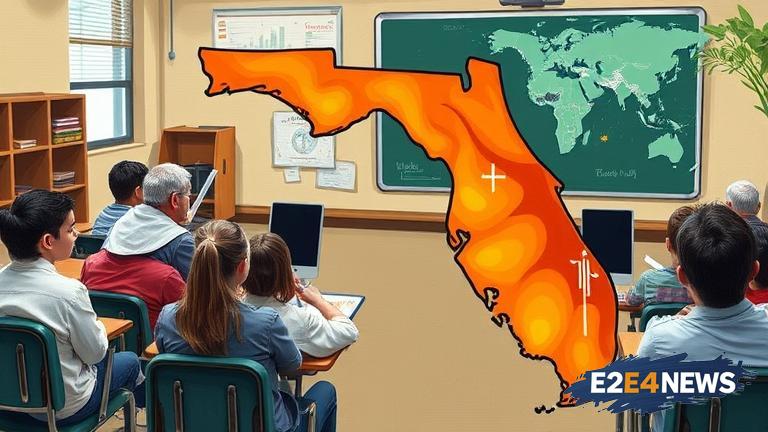A recent report has highlighted the struggles of Florida’s education system in regards to free speech, with the state receiving a poor grade. The report, which was released by a non-partisan organization, analyzed the state’s policies and practices related to free speech on college campuses. According to the report, Florida’s education system has been criticized for its handling of free speech, with many students and faculty members feeling that their rights are being restricted. The report found that the state’s colleges and universities have been inconsistent in their application of free speech policies, with some institutions being more restrictive than others. This has led to a lack of clarity and consistency, making it difficult for students and faculty to know what is and is not allowed. The report also found that Florida’s education system has been impacted by the state’s political climate, with some politicians and administrators using their power to suppress certain viewpoints. This has created a culture of fear and self-censorship, where students and faculty are reluctant to express their opinions or engage in discussions on certain topics. The report’s findings are concerning, as they suggest that Florida’s education system is not living up to its potential as a place where students can freely express themselves and engage in open and honest discussions. The state’s poor grade is a wake-up call for educators, policymakers, and students, who must work together to create a more inclusive and supportive environment for free speech. The report’s authors recommend that Florida’s education system take steps to improve its policies and practices related to free speech, including providing more clarity and consistency in its policies and training for administrators and faculty. They also recommend that the state’s colleges and universities take steps to promote a culture of free speech and open discussion, including hosting events and activities that encourage students to engage with different viewpoints. By taking these steps, Florida’s education system can improve its grade and create a more supportive environment for free speech. The report’s findings are not unique to Florida, as many states and institutions are struggling with issues related to free speech. However, the report’s authors hope that by highlighting the state’s poor grade, they can bring attention to the issue and encourage policymakers and educators to take action. The report is a reminder that free speech is a fundamental right that is essential to a healthy and functioning democracy. It is also a reminder that education is a critical component of a democratic society, as it provides students with the knowledge and skills they need to participate in the democratic process. By promoting free speech and open discussion, Florida’s education system can help to create a more informed and engaged citizenry. The report’s authors believe that this is essential for the health and well-being of democracy, and they hope that their report will encourage policymakers and educators to take action. In conclusion, the report’s findings are a wake-up call for Florida’s education system, which must take steps to improve its policies and practices related to free speech. By promoting a culture of free speech and open discussion, the state’s colleges and universities can create a more inclusive and supportive environment for students and faculty. This is essential for the health and well-being of democracy, and it is critical that policymakers and educators take action to address the issue. The report’s authors hope that their report will bring attention to the issue and encourage policymakers and educators to take action. They believe that by working together, Florida’s education system can improve its grade and create a more supportive environment for free speech. The future of democracy depends on it. The report’s findings have implications for students, faculty, and policymakers, who must work together to create a more inclusive and supportive environment for free speech. The report’s authors recommend that students and faculty take an active role in promoting free speech and open discussion, including hosting events and activities that encourage students to engage with different viewpoints. They also recommend that policymakers take steps to improve the state’s policies and practices related to free speech, including providing more clarity and consistency in its policies and training for administrators and faculty. By taking these steps, Florida’s education system can improve its grade and create a more supportive environment for free speech. The report’s findings are a reminder that free speech is a fundamental right that is essential to a healthy and functioning democracy. It is also a reminder that education is a critical component of a democratic society, as it provides students with the knowledge and skills they need to participate in the democratic process. The report’s authors believe that this is essential for the health and well-being of democracy, and they hope that their report will encourage policymakers and educators to take action.
